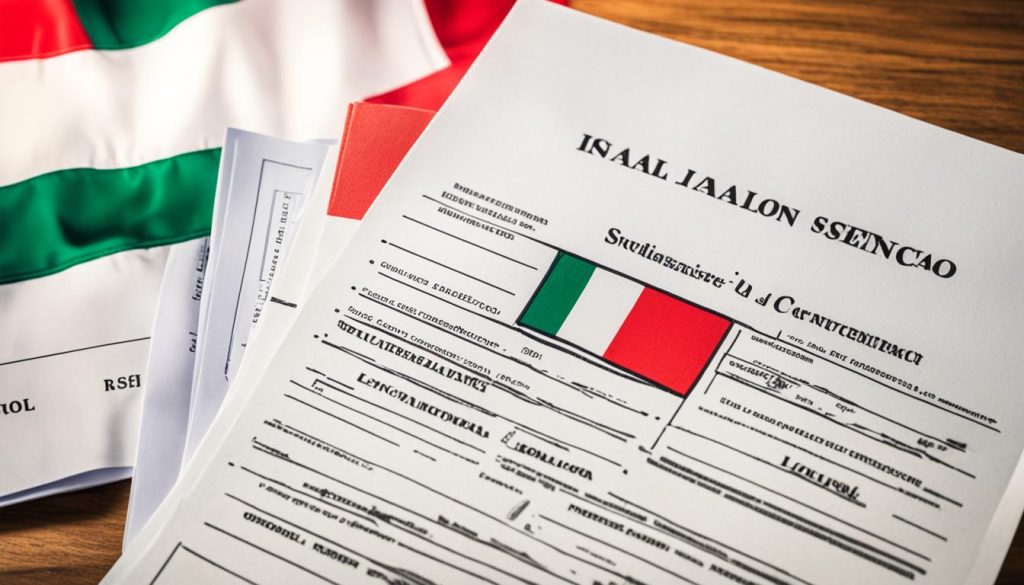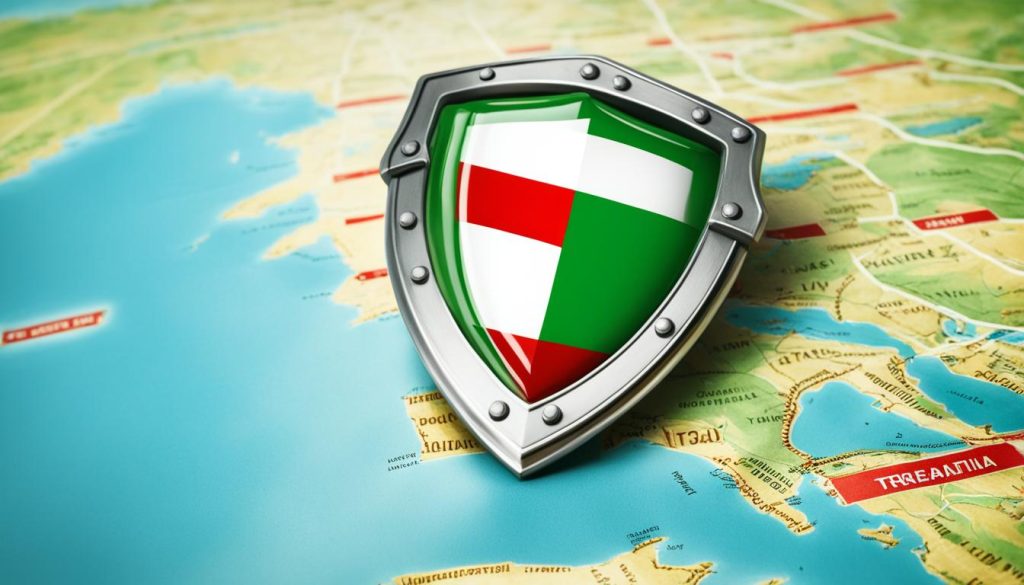Starting a business in Italy requires careful planning and knowledge of steps. Whether aiming for Milan’s markets or Rome’s historic charm, knowing the setup steps is key. It’s about choosing the right business type, understanding costs, and handling legal work.
Entrepreneurs must know about VAT, taxes, and employment laws. Having a business bank account is also necessary. Moreover, registering a trademark, using EU resources, and following local laws are must-do tasks. Knowing the rules and what happens if you don’t follow them is crucial.
Key Takeaways
- Thorough planning is essential for a successful Italian business venture.
- Choosing the right type of company is crucial for aligning with your business goals.
- Understanding cost implications helps in budgeting effectively.
- Legal paperwork, including VAT application, is mandatory.
- Compliance with Italian business laws prevents severe penalties.
Understanding the Different Types of Companies in Italy

Italy has many business structures for different entrepreneurial needs. Your choice affects your business flexibility, taxes, and personal risk.
Private Limited Liability Company (S.r.l.)
An S.r.l. protects shareholder assets from company debts. It’s great for small to medium businesses that want flexibility and a strong legal basis.
Simplified Private Limited Liability Company (Simplified S.r.l.)
The Simplified S.r.l. is for boosting entrepreneurship with less setup needs and costs. It helps startups and entrepreneurs with little money to start their businesses in Italy.
Branch, Representative Office, and Subsidiary
Foreign companies can open a branch, representative office, or subsidiary in Italy. Each one comes with different levels of independence and tax rules. Branches and offices act as extensions of the parent company, while subsidiaries are independent within Italy.
Sole Proprietorship and Partnerships
Sole proprietorships are simple and offer total control but come with unlimited personal risk. Partnerships, including general and limited ones, let partners manage and profit together. They suit professional services and small ventures well.
Choosing the right structure means looking at capital, control, growth potential, and risk level. Whether it’s an S.r.l., Simplified S.r.l., a sole proprietorship, or a partnership, informed decisions lead to success in Italy.
Costs Involved in Setting Up a Company in Italy

Starting a business in Italy means learning about company formation costs Italy. The costs depend on your choice of business structure.
- Private Limited Liability Company (S.r.l.): Setting up an S.r.l costs about €4,000. This fee covers document creation, advisory fees, and other mandatory charges.
- Simplified S.r.l.: This is a cheaper option at around €3,000. It still includes essential setup help and legal fees.
- Branch: Opening a branch costs more, about €5,000. This is due to the complex process of opening under a foreign company.
- Sole Proprietorship: This is the least expensive at €1,300. It covers the basic needs for starting your business.
Choosing a business type needs careful planning to handle startup expenses Italy. Costs include VAT setup, bank account help, and professional advice for a smooth start.
Legal Requirements for Incorporating in Italy

Setting up a company in Italy requires following certain legal steps. Let’s look at the key parts of the incorporation process.
Necessary Documentations
Getting your paperwork in order is a fundamental step in Italy’s incorporation rules. You’ll need the memorandum of incorporation and articles of association. These outline the company’s structure and how it operates. They are vital for setting up a legal entity.
Obtaining a Codice Fiscale
Getting an Italian Codice Fiscale is essential. It’s a tax code for all directors and shareholders. This code identifies you for tax purposes. Without it, you can’t complete the official registration process.
Registering the Company
The last step is to register the company. You need to carry out notarial deeds and register with the Italian Business Register. Once registered, your business is officially recognised and can legally operate.
The Step-by-Step Process for Setting Up a Business in Italy

Starting a business in Italy means choosing the right company structure. You might pick an S.r.l., branch, or be a sole trader. This choice shapes the next steps you’ll take to set up your business. Before moving on, it’s crucial to assess costs and get your paperwork ready.
Getting tax IDs is a key step in Italy. They’re needed for all money matters and following tax laws. Once that’s handled, you’ll officially register your company. This step makes your business legal and ready to operate.
Early on, you should tackle tax and VAT tasks. This keeps you clear of legal troubles later. Facing these financial aspects head-on is critical for success in Italy’s business scene.
Opening a corporate bank account comes next. It’s crucial for managing your business’s money easily. Also, protecting your brand with trademarks and following local laws is essential. These steps are not to be missed.
When you follow these key steps, you’re on your way to doing business in Italy successfully. Each step is part of building a strong foundation for your company.
VAT Application and Tax Obligations
Starting and running a successful business in Italy means dealing with taxes. Understanding VAT registration and your tax duties is key. This helps you stay out of legal trouble and shows you’re a responsible business.
Applying for VAT
Getting your VAT sorted in Italy is pretty simple and is part of the start-up costs. Make sure you fill in all documents correctly to avoid delays. You need to submit certain forms to the Italian Revenue Agency (Agenzia delle Entrate) when you register your business.
Understanding Tax Responsibilities
Businesses in Italy have to manage several tax responsibilities. This includes paying corporate taxes and VAT. The corporate tax rates in Italy can change with new tax laws. You also need to know about regional taxes and taxes specific to your business area to comply fully. Keeping up-to-date with these rules is vital for your business’s financial and legal health.
Employment Law and Hiring in Italy

Getting a grip on Italian employment regulations is key for firms planning to hire in Italy. It’s crucial for employers to make sure their staff, especially those from abroad, have the right to work. If not, the company could face hefty fines, showing the importance of knowing labour laws in Italy well.
When it comes to hiring practices in Italy, checking if potential hires can legally work is a must. And it’s important to keep those permissions up to date. This needs careful record-keeping and a solid grasp of what Italian labour law asks. Such detailed efforts help keep businesses on the right side of the law.
It’s vital for employers to stay informed about their duties within Italian employment regulations. By staying current with labour laws in Italy and keeping all paperwork in order, companies can dodge legal issues. This careful way of managing hiring practices in Italy protects the business and ensures a fair workplace for everyone.
Opening a Business Bank Account

Opening a business bank account in Italy is vital for your company. It helps manage business deals and proves your company’s financial seriousness.
Required Documentation
Start by collecting all necessary documents. Italy asks for:
- Tax Identification Number (Codice Fiscale)
- Incorporation papers
- Identification documents for all company directors and shareholders
- Proof of address for the business
Having complete and correct documents will make opening your account easier.
Selecting the Right Bank
It’s important to choose the best bank for your business. Consider things like:
- Service fees and tariffs
- Range of offered services (e.g., online banking, merchant services)
- International banking capabilities for cross-border transactions
- Customer service quality
Getting advice from professionals can help you pick wisely. The right bank will match your business needs well. This makes managing your money easier, helping your new business grow smoothly.
Trademark Registration in Italy

Getting your trademark protected in Italy is crucial for any business to safeguard its brand. It’s important whether you’re looking at registering within Italy or in the EU. The differences in costs and what you’re covered for matter a lot.
National Vs. European Trademarking
A national trademark keeps your brand safe inside Italy. An EU trademark gives your brand protection across all EU countries.
- National Registration: Best for businesses only working in Italy. It costs less. The process includes getting advice, preparing documents, and applying within Italian laws.
- EU Registration: Great for businesses aiming to protect their brand in many EU countries. It’s pricier but covers more and is done through one application.
Both choices protect your brand from being used without permission. Choosing between national and EU trademark depends on how wide your business reaches.
Trademark protection is key, whether you’re a small local startup or growing big. Legal advice can make registering easier. This helps keep your brand safe in Italy and maybe even all over Europe.
Utilising EU Resources and Support Networks

In the EU, innovation and business growth get a big boost from various support networks. Startup Europe is one great example. It brings startups and investors together to help businesses grow. This network makes sharing tips and opportunities easy for everyone involved.
The InvestEU Portal is another amazing resource. It directs investments to promising businesses. It helps companies find money they need to grow or innovate. This portal is especially valuable for EU businesses wanting to expand.
For Italian businesses, these EU resources are very helpful. They offer money and chances to connect with entrepreneurs and investors throughout Europe. This can lead to cross-border projects and international growth.
Looking into startup support from the EU and its entrepreneurial network is key. These programmes give businesses tools, knowledge, and connections to succeed. They help drive innovation and entrepreneurship in Italy and all over Europe.
Setting Up an Innovative Start-Up in Italy

Innovation drives modern economies, and Italy knows this well. Entrepreneurs eager to lead in Italian tech need to know the process. Setting up an innovative start-up in Italy is made easy with state support.
The Italian government has made it simpler to create innovative start-ups. The whole process costs about €5,000. This covers advice, paperwork, and getting your company registered.
To be recognised, your start-up must register in a special section. This part of the Italian Registrar of Companies helps innovative firms. They offer tax breaks, funding help, and access to growth programmes.
Italy is focused on nurturing innovation. There is ample support for bold entrepreneurs ready to step up. With the right use of resources, start-ups can flourish. This paves the way for breakthroughs in Italy’s tech scene.
Finding the Right Location for Your Business
Choosing the best spot for your business in Italy is key to doing well. Italian business locations vary, each with its own benefits. We look at the top cities for setting up a business.
Major Cities for Business in Italy
Milan is the financial heart, full of life and business activities. It shines in fashion, finance, and tech industries. Its great infrastructure and world links make it an excellent choice for business.
Rome, the capital, is rich in history and political power. It offers special chances because of its government influence and vast culture. Businesses profit from the busy tourism sector and wide market.
Naples stands out in logistics, shipping, and agri-food industries. Its place near the Mediterranean is perfect for trade. Thus, it’s becoming a key business city in Italy.
Turin excels in cars and innovation, making it great for manufacturing and tech firms. Its strong industrial past helps businesses looking for growth.
To sum up, knowing the unique attributes of each city is crucial. It helps in finding the most strategic place for your business in Italy.
Starting a Company in Italy – Essential Checklist
Starting a business in Italy is thrilling but complex. We’ve prepared an entrepreneur checklist to guide you. It includes key steps for your Italian business journey.
- Choosing the Company Type: It’s vital to pick the right business structure. Options include S.r.l. and Simplified S.r.l. among others.
- Understanding Costs: Know your initial expenses. These include legal fees and VAT costs. It helps with budgeting.
- Meeting Legal Requirements: You must gather needed papers, get a Codice Fiscale, and register the company properly.
- Navigating VAT and Taxes: Apply for VAT and learn about corporate taxes. This keeps your business lawful in Italy.
- Employment and Hiring: Follow Italy’s job laws and get work permits for staff. This protects your business operations.
- Opening a Business Bank Account: Choose a good bank and handle the paperwork for account opening. This ensures smooth money dealings.
- Trademark Registration: Protecting your brand, nationally or in the EU, is key. It’s important for your business identity.
- Utilising EU Resources: Use networks like Startup Europe for support. InvestEU Portal also offers growth chances.
- Selecting a Location: Cities like Milan, Rome, and Turin have unique benefits. They vary based on the sector and market.
- Talk to legal experts to understand Italian immigration laws.
- Sign up with tax bodies to get a codice fiscale, an important ID code.
- Gather and hand in all needed papers, including financial proof and health insurance.
- Keep an eye on your application and meet all requirements to avoid hold-ups.
This guide helps with every step of starting a business in Italy. By following it, you’ll understand the market better. It also lays a solid foundation for your company’s future.
Residence Permits and Legal Residency
Getting an Italy residence permit is a must for non-EU business people wanting to start up in Italy. Know the different types and how to apply to make moving to Italian residency smooth.
Types of Residence Permits
Italy has various residence permits for work, self-employment, and company founders. It’s vital to pick the right permit for your business and personal needs. Each permit type has its own rules and time lengths, so understanding these is key.
Application Process
The steps to get an Italian legal residency are:
Keeping your Italy residence permit means renewing it regularly and following immigration rules. Not doing so could lead to fines and harm your business.
Maintaining Compliance and Business Operation in Italy
Running a business in Italy requires strict attention to rules and various operational needs. Every entrepreneur must ensure their permits and licences are renewed on time. This is crucial to meet the compliance standards in Italy.
Renewal of Permits and Licenses
The process of renewing permits and licenses follows Italian immigration rules. It is important to meet government-set deadlines for visas and work authorisations. Companies must also keep their employee records current to uphold their legal status. Not following these rules can lead to delays or fines.
Regular Tax Filings and Reporting
It’s essential for maintaining compliance to file taxes and report them regularly in Italy. Businesses must adhere to Italian tax laws, including those for corporate income tax and VAT. Knowing the tax reporting cycles in Italy helps ensure the business runs smoothly and stays viable long-term.
Penalties for Non-Compliance
Running a business in Italy means you must follow local laws closely, including those on tax, business, and immigration. Failing to do so can seriously affect your business’s future. Penalties for breaking the law in Italy vary. They might include heavy fines or even time in jail, based on the violation.
Not hiring people the right way is a big issue. If you hire someone without the right paperwork, you could face large fines. Furthermore, your business may have to pay to send them back home. Companies caught using migrant workers unfairly are punished even more harshly. This shows how crucial it is to hire ethically and make sure all workers have the correct permissions.
The impact of breaking business laws in Italy goes beyond just fines. If you don’t follow the rules, it could harm your company’s good name and interrupt your operations. So, sticking to the law is not just right; it’s essential for operating in Italy. By keeping up with Italian laws and focusing on compliance, you can protect your business from penalties. This approach also helps build a reputable and reliable business environment.







